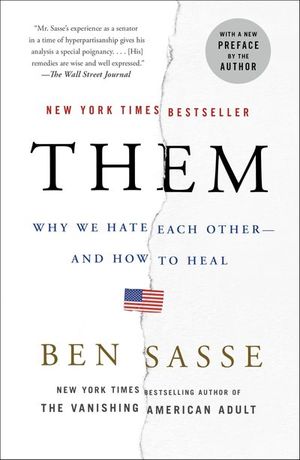Them
Published by St. Martin's Publishing Group
This New York Times bestseller “argues that Americans are richer, more informed and ‘connected’ than ever—and unhappier, more isolated and less fulfilled” (George Will, The Washington Post).
Something is wrong. We all know it.
American life expectancy is declining. Birth rates are dropping. Nearly half of us think the other political party isn’t just wrong; they’re evil. We’re the richest country in history, but we’ve never been more pessimistic. What’s causing the despair? In Them, former US senator Ben Sasse argues that, contrary to conventional wisdom, our crisis isn’t really about politics. It’s that we’re so lonely we can’t see straight—and it bubbles out as anger.
Local communities are collapsing. Across the nation, little leagues and Rotary clubs are dwindling, and in all likelihood, we don’t know the neighbor two doors down. Work offers less security, few lifelong coworkers, shallow purpose. Stable families and enduring friendships—life’s fundamental pillars—are in statistical freefall. As a result, we rally against common enemies so we can feel part of a team. Foreign adversaries use technology to exploit these toxic divisions by sowing misinformation and mistrust, to confuse us, exhaust us, make us angry—and thereby make us weaker.
Reversing our decline requires something radical: a rediscovery of real places and human-to-human relationships. Even as technology nudges us to become rootless, Sasse shows how only a recovery of rootedness can heal our lonely souls. America wants you to be happy, but more urgently, America needs you to love your neighbor and connect with your community. Fixing what’s wrong with the country depends on it.
“Sasse is highly attuned to the cultural sources of our current discontents and dysfunctions. . . . an attempt to diagnose and repair what has led us to this moment of spittle-flecked rage. . . . a step toward healing a hurting nation.” —National Review
“Perhaps at last we have a politician capable of writing a good book rather than having a dull one written for him.” —The Wall Street Journal
“Unpretentious, thoughtful, and at times, quite funny . . . his arguments are worth reading—as are his warnings about what our country might become.” —NPR
Something is wrong. We all know it.
American life expectancy is declining. Birth rates are dropping. Nearly half of us think the other political party isn’t just wrong; they’re evil. We’re the richest country in history, but we’ve never been more pessimistic. What’s causing the despair? In Them, former US senator Ben Sasse argues that, contrary to conventional wisdom, our crisis isn’t really about politics. It’s that we’re so lonely we can’t see straight—and it bubbles out as anger.
Local communities are collapsing. Across the nation, little leagues and Rotary clubs are dwindling, and in all likelihood, we don’t know the neighbor two doors down. Work offers less security, few lifelong coworkers, shallow purpose. Stable families and enduring friendships—life’s fundamental pillars—are in statistical freefall. As a result, we rally against common enemies so we can feel part of a team. Foreign adversaries use technology to exploit these toxic divisions by sowing misinformation and mistrust, to confuse us, exhaust us, make us angry—and thereby make us weaker.
Reversing our decline requires something radical: a rediscovery of real places and human-to-human relationships. Even as technology nudges us to become rootless, Sasse shows how only a recovery of rootedness can heal our lonely souls. America wants you to be happy, but more urgently, America needs you to love your neighbor and connect with your community. Fixing what’s wrong with the country depends on it.
“Sasse is highly attuned to the cultural sources of our current discontents and dysfunctions. . . . an attempt to diagnose and repair what has led us to this moment of spittle-flecked rage. . . . a step toward healing a hurting nation.” —National Review
“Perhaps at last we have a politician capable of writing a good book rather than having a dull one written for him.” —The Wall Street Journal
“Unpretentious, thoughtful, and at times, quite funny . . . his arguments are worth reading—as are his warnings about what our country might become.” —NPR
BUY NOW FROM
COMMUNITY REVIEWS

